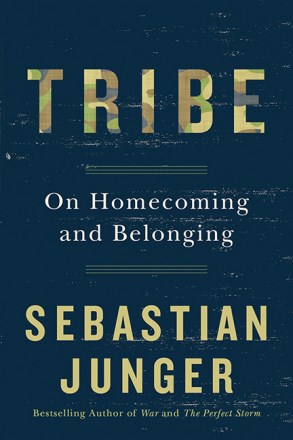If you’ve ever heard the latest news about a mass shooting or suicide epidemic and thought to yourself, “What is wrong with society?” then Sebastian Junger’s latest book Tribe: On Homecoming and Belonging has a possible answer for you.
It may be actually be society itself.
Probably best-known as the writer of A Perfect Storm, a 1997 non-fiction book made into a movie starring George Clooney and Mark Wahlberg, Junger has also reported from various war zones. That experience, particularly his own readjustment to normal life after spending time in conflict areas and his observation of the high rate of American veterans of the Iraq and Afghanistan wars suffering from chronic post-traumatic stress disorder (PTSD), prompted him to examine if there was something about modern American society – and other Northern European-rooted societies – that made it difficult to re-assimilate.
Examining historical eras ranging from the early settlement of the western United States to the siege of Sarajevo, the bombing of Britain in the Second World War and the immediate aftermath of the 9/11 attacks in New York, Junger details some counterintuitive facts and explains them in terms of human evolution.
Modern Western civilization, he argues, is an aberration in the long chronology of human existence, most of which has been spent with humans living in small, tightly connected groups battling common enemies to survive. Only recently, in evolutionary terms, have people been placed in situations in which they are more likely to encounter strangers than members of their non-virtual social network and, as a result, they feel disconnected. This helps explain how Junger found himself better able to sleep while embedded with soldiers in dangerous territory in Afghanistan; being together and most often within arms’ reach of two or three other people 24 hours per day is a more natural state than spending time alone.
Tribe argues that the greater incidence of PTSD among veterans of more recent wars is explained by the all-volunteer nature of the modern U.S. army along with well-intentioned government support programs that encourage veterans to see themselves as victims. By contrast, Junger writes, in places like Israel, where wars are on the general population’s doorstep and virtually all adults go through military training and service, the rate of PTSD is much lower. The book also explains how shared suffering and sacrifice, such as that experienced during the siege of Sarajevo and the Blitz can actually bring people together, allowing them to assume roles in which they feel useful and, paradoxically, reducing the incidence of depression and mental health issues and even suicide.
Part of the genesis of Junger’s book, which grew out of an article on the same topic he wrote for Vanity Fair, was the historical phenomenon of white U.S. settlers abandoning the society they’d grown up with to live as adopted members of American Indian tribes, some by choice and others as the result of abduction. Conversely, it was noted at the time, the opposite almost never happened and Junger suggests this may have been because the culture that was presumed to be more primitive and less advanced was better at providing people with what they need to be really happy: feeling productive, authentic and connected to others in an egalitarian society in which defeats and successes are shared by all.
A brief read at only 138 pages, not including notes on source materials, Tribe is nevertheless packed with information and examples that help explain why, in some of the richest and physically healthiest societies that have ever existed in human history, there are people like veterans – and war zone journalists – who find upon returning that they actually prefer the conditions of war. It doesn’t offer simple-minded solutions and, almost unspeakably in the currently polarized climate in which Americans and citizens of other Western countries are living, suggests that both conservatives and liberals are right about some things. The premise can change the way people view everything from economics to child-rearing by giving them a better understanding of how evolution has shaped human behaviour and maybe even inspire thoughtful policies and solutions to alleviate the ills society seems to be inflicting upon at least some of its members.
Tribe is published by Harper Collins Canada and available at the Thompson Public Library.




